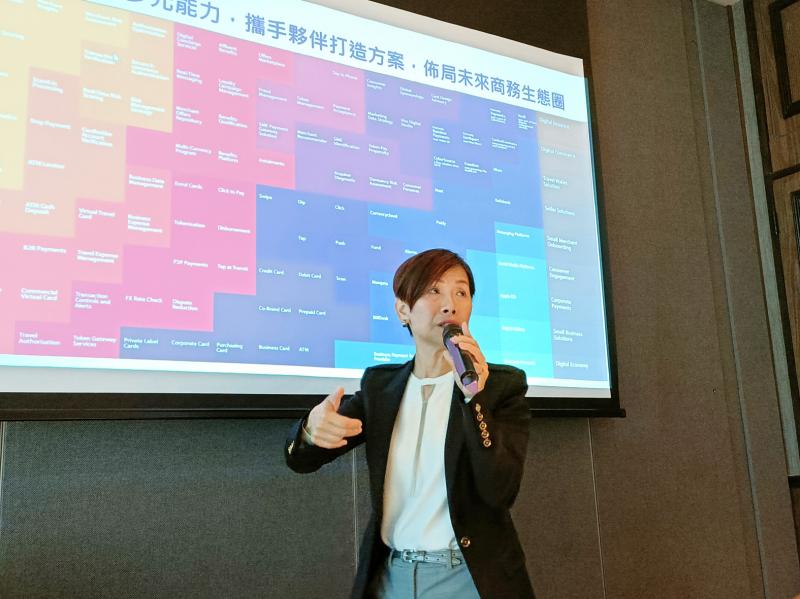Credit and debit cards have replaced cash as the most common payment method in Taiwan, Visa Taiwan Co (台灣威士卡) said in a report on Thursday last week.
A survey of 800 people conducted in August last year showed that about 80 percent of respondents used credit cards daily, while about 77 percent used cash and 58 percent used stored-value cards, such as EasyCards and iPass cards, Visa Taiwan said.
A 2019 study showed that cash was the most popular payment method in the nation, with 91 percent of respondents using cash daily and 83 percent using credit and debit cards, it said.

Photo: Lee Chin-hui, Taipei Times
“Cash is no longer king,” Visa said.
The company attributed the trend to the popularity of contactless payment amid the COVID-19 outbreak, reward point systems by banks issuing credit cards and the booming e-commerce sector.
The recent survey found that only 35 percent of respondents used cash as their main payment method, down from 41 percent in 2019, while 64 percent said that they preferred cashless payment methods for purchases above NT$400 (US$14), up from 58 percent a year earlier.
Fifty-one percent of respondents shopped online at least once per week, up from 50 percent before the COVID-19 pandemic, while 54 percent said that they used online banking, compared with 49 percent before the pandemic, Visa Taiwan said.
Food deliveries, fresh vegetables and meat, and healthcare products were the top three items on people’s online shopping lists, it added.
Separately, German food delivery firm Foodpanda GmbH gained approval from the Investment Commission last week to invest NT$5 billion into local subsidiary Foodpanda Taiwan Co Ltd (富胖達).
The commission also approved another 18 million euro (US$21.85 million) investment by the German company to boost its working capital, the commission said.
The investments showed the rising importance of the food delivery market in Taiwan, it said.
Additional reporting by CNA

Merida Industry Co (美利達) has seen signs of recovery in the US and European markets this year, as customers are gradually depleting their inventories, the bicycle maker told shareholders yesterday. Given robust growth in new orders at its Taiwanese factory, coupled with its subsidiaries’ improving performance, Merida said it remains confident about the bicycle market’s prospects and expects steady growth in its core business this year. CAUTION ON CHINA However, the company must handle the Chinese market with great caution, as sales of road bikes there have declined significantly, affecting its revenue and profitability, Merida said in a statement, adding that it would

RISING: Strong exports, and life insurance companies’ efforts to manage currency risks indicates the NT dollar would eventually pass the 29 level, an expert said The New Taiwan dollar yesterday rallied to its strongest in three years amid inflows to the nation’s stock market and broad-based weakness in the US dollar. Exporter sales of the US currency and a repatriation of funds from local asset managers also played a role, said two traders, who asked not to be identified as they were not authorized to speak publicly. State-owned banks were seen buying the greenback yesterday, but only at a moderate scale, the traders said. The local currency gained 0.77 percent, outperforming almost all of its Asian peers, to close at NT$29.165 per US dollar in Taipei trading yesterday. The

RECORD LOW: Global firms’ increased inventories, tariff disputes not yet impacting Taiwan and new graduates not yet entering the market contributed to the decrease Taiwan’s unemployment rate last month dropped to 3.3 percent, the lowest for the month in 25 years, as strong exports and resilient domestic demand boosted hiring across various sectors, the Directorate-General of Budget, Accounting and Statistics (DGBAS) said yesterday. After seasonal adjustments, the jobless rate eased to 3.34 percent, the best performance in 24 years, suggesting a stable labor market, although a mild increase is expected with the graduation season from this month through August, the statistics agency said. “Potential shocks from tariff disputes between the US and China have yet to affect Taiwan’s job market,” Census Department Deputy Director Tan Wen-ling

UNCERTAINTIES: The world’s biggest chip packager and tester is closely monitoring the US’ tariff policy before making any capacity adjustments, a company official said ASE Technology Holding Inc (日月光投控), the world’s biggest chip packager and tester, yesterday said it is cautiously evaluating new advanced packaging capacity expansion in the US in response to customers’ requests amid uncertainties about the US’ tariff policy. Compared with its semiconductor peers, ASE has been relatively prudent about building new capacity in the US. However, the company is adjusting its global manufacturing footprint expansion after US President Donald Trump announced “reciprocal” tariffs in April, and new import duties targeting semiconductors and other items that are vital to national security. ASE subsidiary Siliconware Precision Industries Co (SPIL, 矽品精密) is participating in Nvidia